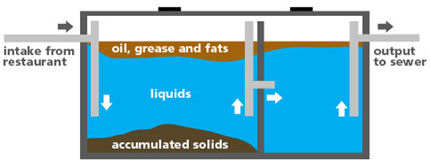

 Q:What is a Grease Trap?
A: A grease trap or grease interceptor is a receptacle located between the restaurant drain lines and the sanitary sewer lines that allows for the separation and collection of fats, oils and greases from the used water, preventing such materials from entering the municipal sewer system.
The grease trap can either be located inside the establishment or on the outside. Typically, large restaurants or school kitchens will have their grease trap/grease interceptor located outside of the facility, usually in the ground, while facilities with smaller traps can usually house theirs indoors.
Q:Why Do I Need a Grease Trap?
A:Fats, oils and grease wreak all kinds of havoc on municipal
wastewater systems which is why local municipalities require
commercial kitchens to have a grease trap installed.
Most municipalities will
Q:What is a Grease Trap?
A: A grease trap or grease interceptor is a receptacle located between the restaurant drain lines and the sanitary sewer lines that allows for the separation and collection of fats, oils and greases from the used water, preventing such materials from entering the municipal sewer system.
The grease trap can either be located inside the establishment or on the outside. Typically, large restaurants or school kitchens will have their grease trap/grease interceptor located outside of the facility, usually in the ground, while facilities with smaller traps can usually house theirs indoors.
Q:Why Do I Need a Grease Trap?
A:Fats, oils and grease wreak all kinds of havoc on municipal
wastewater systems which is why local municipalities require
commercial kitchens to have a grease trap installed.
Most municipalities will have a maximum amount of FOG
that are acceptable in the water leaving an establishment. If
these maximums are exceeded, fines may be imposed and/or
the establishment closed down.
Q:How Does a Grease Trap Work?
A:Grease traps slow down the flow of water coming from drains,
allowing the water and grease time to cool. This cooling causes
the grease to coagulate and float to the top, while other, heavier
solids, fall to the bottom of the trap. The remaining water is free
to pass through on to the city sewer lines.
Grease will float to the top and solids will accumulate at the bottom.
The solid accumulation collects at the bottom and failing to completely remove both solids and grease deposits can cause the blockage of the exit pipe. This will lock in the water inside causing the kitchen lines and grease trap / interceptor to overflow or clog.
Pumping and Cleaning Your Grease Trap System.
An un-maintained grease trap / interceptor in a restaurant or other foodservice location is a significant problem for municipal wastewater collection or sewer systems. Fats, oils and grease can solidify and congest the main pipeline that leads to the city sewer system. Failing to properly manage grease traps and interceptors can lead to violations as well as cause blockage that may prevent you from running your daily operations.
Failure to properly service your grease trap can cause your lines to clog, overflow and release unpleasant odors. We recommend that your grease trap be serviced quarterly to prevent any disruption, costly service or fines to your establishment
have a maximum amount of FOG
that are acceptable in the water leaving an establishment. If
these maximums are exceeded, fines may be imposed and/or
the establishment closed down.
Q:How Does a Grease Trap Work?
A:Grease traps slow down the flow of water coming from drains,
allowing the water and grease time to cool. This cooling causes
the grease to coagulate and float to the top, while other, heavier
solids, fall to the bottom of the trap. The remaining water is free
to pass through on to the city sewer lines.
Grease will float to the top and solids will accumulate at the bottom.
The solid accumulation collects at the bottom and failing to completely remove both solids and grease deposits can cause the blockage of the exit pipe. This will lock in the water inside causing the kitchen lines and grease trap / interceptor to overflow or clog.
Pumping and Cleaning Your Grease Trap System.
An un-maintained grease trap / interceptor in a restaurant or other foodservice location is a significant problem for municipal wastewater collection or sewer systems. Fats, oils and grease can solidify and congest the main pipeline that leads to the city sewer system. Failing to properly manage grease traps and interceptors can lead to violations as well as cause blockage that may prevent you from running your daily operations.
Failure to properly service your grease trap can cause your lines to clog, overflow and release unpleasant odors. We recommend that your grease trap be serviced quarterly to prevent any disruption, costly service or fines to your establishmentInterior Passive Grease Trap Cleaning & Maintenance Log
 Exterior Grease Trap Cleaning & Maintenance Log
Exterior Grease Trap Cleaning & Maintenance Log
 Automatic Grease Recovery Unit Cleaning & Maintenance Log
Automatic Grease Recovery Unit Cleaning & Maintenance Log



